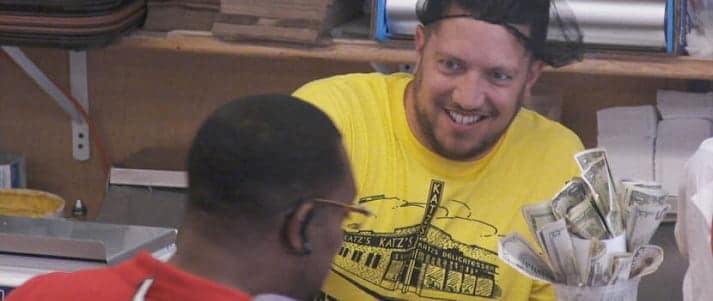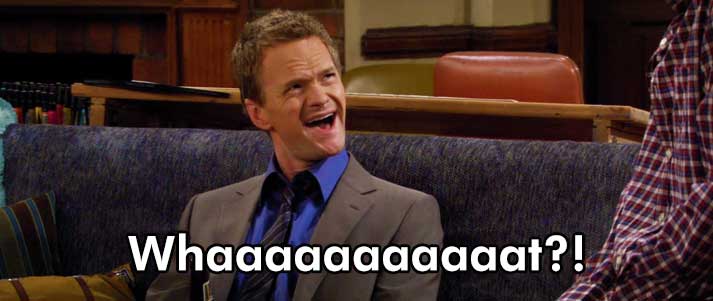Waiters and waitresses are about to get a huge boost to their wages
It comes two years after a government review recommended that all tips go to serving staff – not their employers.

Credit (right): Giphy
Student waiters and waitresses rejoice! You're about to receive a much bigger chunk of the tips you've earned.
Over the past few years, restaurant owners have been found to deduct high percentages of tip money from waiting staff – especially when the tip has been paid by card. But that should now become a thing of the past.
Prime Minster Theresa May announced on Monday that, two years after an official review proposed the motion, employers must give serving staff all their due tips, rather than keeping money for themselves.
Where does tip money currently go?

Credit: truTV
Deciding to pay your tip in cash can make a huge difference to where it ends up.
Legally, cash tips are the property of waiting staff. This may mean tips are distributed evenly among waiting staff, or that each waiter or waitress gets to keep the tips from the tables they are serving. Whatever happens, the business has no right to keep any of these tips.
It's different for card tips, however, which belong to the owner of the restaurant. The owner has no legal obligation to give these tips to staff – although it's worth adding that many do, especially since the recent criticism of those who don't.
The same rules (or lack thereof) apply to service charges (a percentage of your bill which is automatically added on top of the money you owe for food and drinks). With card payments, businesses can do whatever they please, meaning some even keep all of the tips for themselves.
The problem was originally called out in 2015, when it emerged that many high street chains were taking up to 10% of tips paid by debit and credit card.
Among the offenders outed at the time were Bella Italia and Giraffe, although they have since stopped this practice. Pizza Express was also found to be deducting 8% of card tips, but stopped this in 2015 after a campaign.
Earlier this year, TGI Fridays was discovered to be deducting 40% of card tips from waiting staff, instead passing them on to kitchen staff as a way to avoid paying them more.
What will happen to tips now?

Credit: Nickelodeon
Going forward, no matter how tips are paid, serving staff will be entitled to 100% of the tips given by customers. Businesses, meanwhile, will have no right to take any of them.
Theresa May explained the tips ban has been introduced to ensure everyone is treated fairly. She said:
That’s why we will introduce tough new legislation to ensure that workers get to keep all of their tips – banning employers from making any deductions.
The original review was led in 2016 by the then business secretary, Sajid Javid, who said at the time that the government would consider whether to toughen up an existing voluntary code or legislate. Legislation was not pursued at that point.
The official trade body, UK Hospitality, said the fact that restaurants had acted voluntarily meant there was no need for new laws. But the trade union, Unite, explained restaurant chains had been getting away with malpractice with tips because of the government’s failure to regulate.
A time frame for the introduction of a law to ban tip deductions has not yet been decided, but it seems that legislation will be passed in England, Scotland, and Wales.
It's also unclear whether the legislation will ban tips given to waiting staff being redistributed among kitchen staff and cooks.
What’s the deal with tip etiquette?

Credit: CBS
If money is tight, as it is for many students, paying a tip on top of a meal which has already squeezed your purse might leave a sour taste in your mouth.
Unlike in many countries, such as the USA, tipping is in no way essential in the UK. That said, restaurant staff might find you quite rude if you leave no kind of tip – you do, unfortunately, run the risk of some dirty looks if you make that decision.
If you are happy to tip, 10% of the bill is generally seen as the accepted amount – though of course it doesn’t have to be exactly this.
- 16 easy ways to eat out on a budget
- Our competitions are free to enter, and the prizes are incredible!
Sometimes people tip 12.5% to 15% in London restaurants but, once again, this is not obligatory.
Crucially, if the service or meal is bad, there’s no need to tip. Tipping is not a hard-wired expectation in the UK because, unlike elsewhere in the world, restaurants here must pay their staff a minimum wage.
Some restaurants add compulsory service charge to the bill, but they should make this clear to you when you arrive. It is slightly different to a tip, which is discretionary and not added to the bill. You can refuse to pay the service charge, but only if the service was very poor – enough so that the restaurant is in breach of contract.
Do you think it's right of restaurants to automatically add a service charge to the bill? Let us know in the comments!








